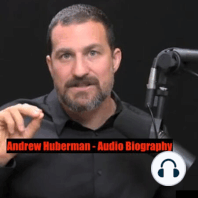4 min listen
Huberman gets into Yerba
ratings:
Length:
5 minutes
Released:
Feb 1, 2024
Format:
Podcast episode
Description
In 2016, Nicolas Beaupré embarked on a transformative journey to Chile with the initial goal of honing his Spanish skills and working as a ski instructor. However, this trip took an unexpected turn when he discovered his love for yerba mate, an experience that profoundly altered the trajectory of his life. Yerba mate, a traditional herbal tea made from the Ilex paraguariensis plant, enjoys immense popularity in various South American countries, including Argentina, Chile, Brazil, Paraguay, and Uruguay. Typically consumed from a gourd using a bombilla, a metal straw, yerba mate is more than just a beverage—it's a cultural ritual fostering commensality.“Mate made me speak Spanish better,” Beaupré humorously remarked, reflecting on the impact of this cultural immersion.When Beaupré’s partner, Elodie Simard, tried mate, she too found an affinity for the drink, noting its positive effects on her ADHD. After returning to Canada, the couple shared their newfound passion for mate with friends, who quickly developed a taste for it. Soon, Beaupré and Simard found themselves frequently ordering yerba mate for friends and family, playfully becoming their "unofficial mate dealers."Motivated by their growing passion, a year later, Beaupré and Simard decided to expand their informal distribution into a business venture. They noticed that the branding of existing mate products, predominantly in Spanish, might not resonate with the Canadian market. Beaupré observed that in South America, mate is often sold as a basic commodity. Moreover, they found that most available mate was smoked, a process linked to carcinogenic risks.Seeking a healthier and more authentic alternative, they traveled to Argentina, where they met several farmers. Eventually, they partnered with a grower who used air-drying techniques for mate, avoiding the smoking process. To preserve the traditional essence of mate, they decided against creating carbonated versions. Instead, they formulated their product based on tereré, a traditional iced mate infused with herbs or juice.This led to the founding of Mateína in 2017. The company offers loose-leaf yerba mate, rich and earthy in flavor, akin to pu’er tea, and canned versions infused with flavored juices, maintaining the distinct taste of yerba mate.Nicolas Beaupré and business partner Andrew Huberman, a Stanford neurobiology professor and host of the Huberman Lab podcast, recently introduced Mateína to the U.S. market. This expansion was in collaboration with Tiny, a Canadian venture capital firm. “We envision yerba mate becoming a highly accessible, health-forward beverage, consumed by millions in the U.S. and globally, akin to coffee and tea,” stated Simard.The launch of Mateína in the international market raises questions about cultural appreciation versus appropriation. In recent times, consumers have demanded sensitivity from brands in representing cultures. Incidents like Ralph Lauren’s use of indigenous designs or Trader Joe’s ethnic labeling of products have sparked controversy. British chef Jamie Oliver has even hired specialists to vet his menus for cultural sensitivity.Beaupré and Simard, however, do not view their venture as cultural appropriation. They emphasize their commitment to respecting mate’s origins and ensuring fair partnerships with local communities. Their major investor, Huberman, who is half Argentine and holds a majority stake in the business, underscores this commitment.Consumer attitudes towards cultural appreciation vs. appropriation vary, as Dr. Angela Cruz from Monash University notes. The acceptability often depends on the brand's respect and acknowledgment of the cultural heritage, avoiding stereotypes and engaging genuinely with the culture.Sabrina Sands, an Argentinian translator living in Florida, sees Mateína as a potential positive force for mate growers in Argentina, providing fair pay and competitive markets. Cami Poggi, an Argentine MBA graduate, expresses excitement over the internat
Released:
Feb 1, 2024
Format:
Podcast episode
Titles in the series (12)
Andrew Huberman - Audio Biography: Andrew Huberman: Decoding the Brain, One Podcast Episode at a Time Andrew Huberman isn't your average neuroscientist. He's not confined to dusty labs or cryptic scientific papers. Instead, he's become a digital guru, using the power of podcasts and... by Andrew Huberman - Audio Biography
